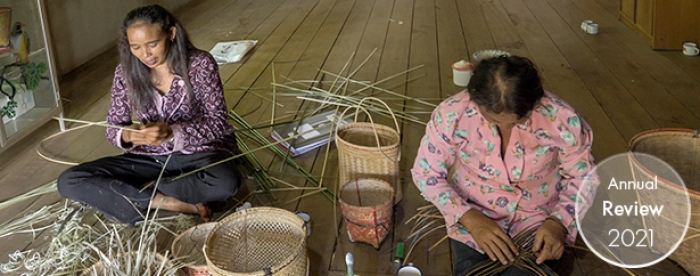News
Our stories ... ...

General - 15 June, 2022
Small and medium-sized enterprises (SMEs) in the agroforestry and forestry sectors require access to finance to make investments in sustainable practices. With this aim, TBI increases their capacity to develop bankable business proposals. At the same time, TBI collaborates with financial service providers to make new and existing financial products more easily available for SMEs.
SMEs in the forestry and agroforestry sectors play a crucial role in shaping vibrant, climate-smart landscapes. Their potential, however, is often hampered by their lack of access to finance. Although they may have good ideas for developing sustainable production and processing practices, they often lack the skills to develop these ideas into bankable business proposals and get access to finance.
In 2021, TBI organized extensive training for its members and partners to familiarize them with the ins and outs of business plans, so they will eventually be able to help others with developing bankable proposals. The training was given by consultants from Fair and Sustainable to teams of two or three staff members from each organization. Each team selected a business case, which they then developed under the guidance of the trainers. Some of these cases focused on productive activities, while others focused on the development of financial mechanisms to facilitate investments in climate-smart landscapes. In this way, the training not only increased the staff’s capacity, but also resulted in actual business cases. Some of these cases will be implemented in the coming years, as part of a new and innovative TBI programme supported by the Netherlands Postcode Lottery.
Complementary to the training, Tropenbos Indonesia and Tropenbos Ghana launched calls for sustainable business ideas in the landscapes where they work, as part of the Mobilizing More for Climate (MoMo4C) programme. Tropenbos Indonesia selected 14 business cases, which they then helped to develop into bankable proposals. As a result, by the end of 2021 a proposal for a horticulture business had successfully obtained finance from a local credit union. More proposals may follow. In Ghana, the call for business ideas generated a staggering 120 proposals, mostly to help cocoa farmers with decreasing their vulnerability in the face of climate change. Tropenbos Ghana then selected ten proposals that were developed further. Four of the ten proposals are up and running, and about to receive financial support from a local financial institution. These include businesses in cocoa agroforestry consultancy services, aquaculture and processing, cassava production and processing, and soap production using local materials.
The idea behind the two calls was not only to develop bankable business ideas, but also to raise interest among financial institutions, which are typically reluctant to provide loans to SMEs in the agroforestry and forestry sectors. Parallel to the development of actual business cases, Tropenbos Ghana and Tropenbos Indonesia therefore started working with financial institutions to develop financial instruments that are suited to agroforestry and forestry SMEs, and to promote sustainability. This work already started to show results in 2021. In Indonesia, for example, the Semandang Jaya credit union, which serves around 50,000 clients in West and Central Kalimantan, formally adopted no-deforestation criteria in one of their loan application processes. This is a key step in achieving climate-smart landscapes.

due for release in July 2022